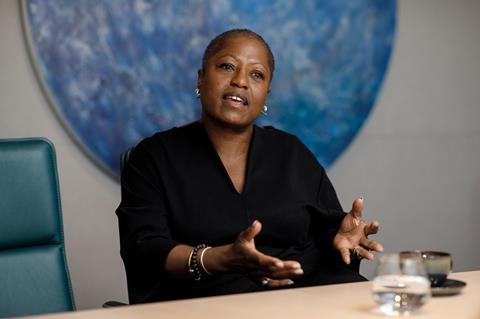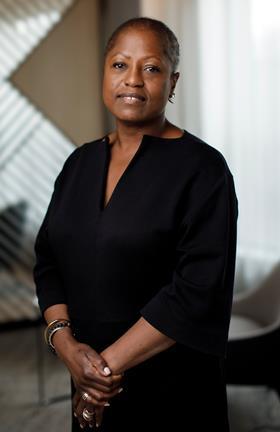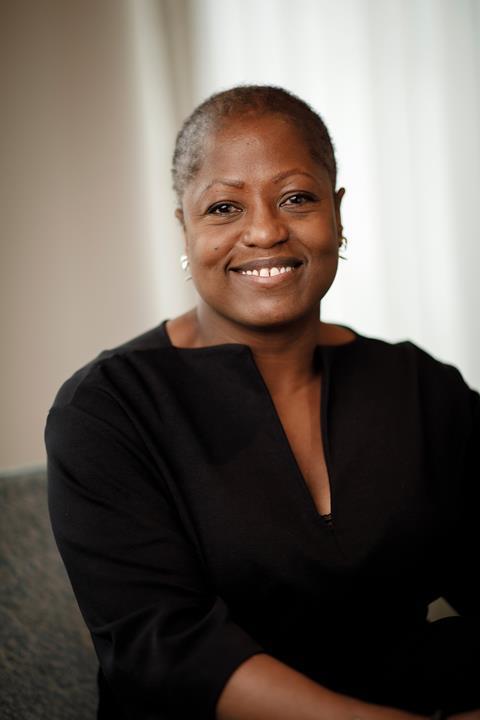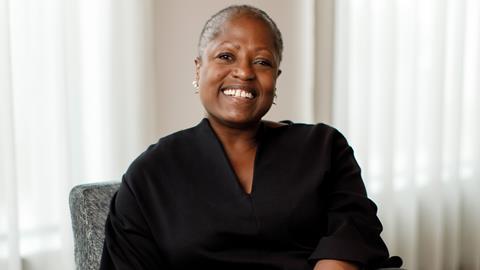Kingsley Napley’s Sandra Paul, a former social worker, talks to Eduardo Reyes about law as a second career and how she has seen the profession ‘change beyond recognition’
BIOG
BORN
London
EDUCATION
University of Bath, 1988-1992
University of West London, Ealing, 1995-1997
College of Law, Store Street, London, 2000-2001
ROLES
Social worker and manager at London councils Kensington and Chelsea, Hounslow and Harrow, 1992-2000
Hodge Jones & Allen: trainee (2001-2003), solicitor (2003-2006), partner (2007-2014)
Kingsley Napley: associate (2014-2016), partner (2016-present)
KNOWN FOR
Criminal law partner for high-profile sexual misconduct cases; chair, Justice working party on youth justice
‘I still have a real interest in children, young people, how they work, how they tick.’ Sandra Paul is reflecting on the ‘common thread’ between her first career – eight years as social worker in London – and her second, as a leading criminal law partner at Kingsley Napley. ‘I’m interested in what people do, why they do it, what motivates people; I’m curious about why people do the things that they do.’ She talks about people making ‘poor decisions’ that ‘sometimes… are made by their circumstances’, and for whom she therefore wanted ‘to do something’.
Such curiosity and evident empathy led her to social work. ‘I really enjoyed it, but it’s one of those jobs where you are always courting disaster,’ Paul says. ‘By the time I finished I was managing eight social workers, all of whom had a caseload of maybe 50 families. If any one of those parents makes some fatal mistake, it’s not going to be them on the front of a newspaper, it’s going to be me as their social worker, [or me as] manager responsible for this team. That’s a lot of pressure and at the time I was quite young.’
Social work was ‘interesting’ and ‘challenging’, but ‘you could see that if you were wanting to have a life of your own, that wasn’t going to work’. Still, she was spending time with solicitors and barristers whom, she recalls, ‘regurgitated what I had written in my assessment, and I [thought], “Well, I could do that and probably do it better in terms of trying to explain myself”.’
Paul started studying law part-time at the University of West London in Ealing. Her thinking was, ‘let’s just see what it’s like’. She found law was ‘firing’ her imagination, though commitment to studies – and work – went alongside starting a family. By the time she sat the GDL she had two children: Keira (then two and a half) and Zac (one). ‘A bit of a juggle really,’ she reflects, crediting strict organisation, a supportive partner and a mortgage extension for getting through.
'When you have had to turn up at somebody’s house never having met them before and remove their children, and do that without there being some violence, you learn to manage stress'
She struggled to get a training contract, ‘because, by then, you’re 30 with two small children and you’re not your typical applicant… especially back then’. It was the mid-1990s and she was up against the sort of ‘Oxbridge graduates’ the profession seemed to favour.
‘The law has changed so much and that’s the thing that’s really good about it. The profession has changed beyond recognition in my time. It’s not that young lawyers don’t make good lawyers, they make different lawyers. [But] what I had at that stage was a whole bunch of life experience, which I’ve incorporated as part of my practice.’
Paul comes across as calm, even when animated in making a point (which is often). Her experience in social work helps her deal with pressured or difficult situations. As she explains: ‘When you have had to turn up at somebody’s house never having met them before and remove their children, and do that without there being some violence, you learn to manage stress. You learn to work out very quickly who people are, how they work.’

It was on her second application to Hodge Jones & Allen that Paul secured a training contract. ‘I’m good friends with Nigel Richardson, who interviewed me,’ she says. ‘He was scribbling through the interview because, [he says], there was all this stuff not just about law, but about life and how to approach people, which was new and which was interesting to them.’
‘I really enjoyed it,’ she recalls. ‘I did a seat in family; that’s what I wanted to do and the beginning was really good. I was working with somebody involved in the Victoria Climbie Inquiry, which is exactly my space, my sweet spot.’
But towards the end of her family seat, she saw more routine cases akin to ‘processing the arguments regarding who’s going to have the Smeg cooker.
‘I thought this definitely isn’t for me! I found it really frustrating. It wasn’t what I thought it was going to be. It didn’t allow me to make a difference.’
So Paul qualified into the criminal law department. ‘Crime became my thing, the complete range of people, adults, children. I was doing all sorts of crime then. I was doing guns, drugs, everything.’
She concluded early on that part of her job as a defence solicitor was ‘being able to explain why somebody has ended up making the decisions that they’ve made; or that the structures that we have [explain] why this person is in this situation. [I wanted to] be able to unpack that and explain that’.
The way that you do it
Reflecting on her career, Sandra Paul cites the impact of key influencers. Greg Foxsmith, a former Hodge Jones & Allen partner who recently joined Kingsley Napley, was one: ‘He just made me really understand not just what I’m supposed to be doing, but why, and the amount of energy that I’m supposed to add to it.’ She also has praise for Kingsley Napley’s managing partner Linda Woolley, who runs the firm with ‘clarity and compassion’.

She also recalls the importance of ‘black female lawyers who you would meet at court. They’d say, “Oh no, let me help you with that”… There was a network of people who just chivvied me along and challenged me to do better; when they thought I wasn’t doing what I was supposed to be doing or, when I was successful, just really supported me and bigged me up about it. A variety of people were really important to me.’
As a high-profile criminal solicitor, Paul says it is important to be accessible to aspiring lawyers. Speaking at events, and publishing articles and blogs helps with that accessibility, she says, leading people to approach her for advice.
Her very first client was hip hop collective So Solid Crew’s Ashley Walters, charged with a firearms offence. Paul recalls ‘turning up to Southwark Crown Court for his plea hearing. There was a lot of press interest. I go down and fill in a [legal aid] form B with him, ask him for details regarding how much he spends on dry cleaning and security, and all the rest of it. Because it was all means-tested’.
She is still in touch with some clients from her time at Hodge Jones & Allen: ‘A chap I represented still sends me a message every day. He says, “How are you?”. I know it sounds a bit stalker-ish – it’s not. What he’s telling me is that you have had an impact. It’s probably very selfish of me, but I enjoy that, thinking I did something useful.’
Paul’s career in criminal law has spanned a period when policymakers have competed to sound tough on crime, cheered on by the press. ‘People,’ she observes, ‘have a perception that those who are in touch with the criminal justice system are somehow different from them, that these are other people who do bad things. It’s very simplistic – linear – and it couldn’t be further from the truth.’
She became an HJA partner quickly and recalls ‘quite a political firm’ with a ‘really positive’ culture. But a major challenge was its financial model. ‘It was predominantly legal aid, and so the firm was constantly [cross]-subsidising the work. And that curtails your ability to be innovative, to do things in the way that they should be done.’ Such frustration, she notes, does not reflect ‘the lack of acumen or interest’ among lawyers. The system was and remains ‘broken’.
Paul was approached by Kingsley Napley and joined the firm eight years ago. Her experience there confirms her view that clients who are dependent on legal aid in criminal cases are often let down by that dysfunctionality.
'It was predominantly legal aid, and so the firm was constantly [cross]-subsidising the work. And that curtails your ability to be innovative, to do things in the way that they should be done'
At her firm, she explains, ‘you have a different kind of criminal client. And the difference between those two groups is just money. They have the same failings, they have the same desires, they [do] the same stupid things. They also have the same misfortune of circumstances, whether it’s being in the wrong place at the wrong time or not having dealt with something well. This results in an investigation or a complaint to the police regarding their conduct. It’s just packaged differently.’
Although clients these days include ‘bankers, heads of huge multinational organisations, pop stars, musicians’, alongside ‘ordinary people whose children are in trouble at school’, all have the ‘same fundamental human problems’.
‘I should feel comfortable and sleep well at the end of the court process. I should be able to say I know that that person has had a fair crack of the whip, they’ve had access to justice, they’ve been able to put their case fairly and if you’re convicted at the end of it, you have to live with it.
‘I don’t feel that comfort as a citizen. Because the process that I see – simple, speedy summary justice – it’s speedy sometimes, but it’s not justice at all.’
#MeToo
Most of Paul’s cases now relate to advising on or defending accusations of sexual misconduct. Her time at Kingsley Napley has coincided with the #MeToo movement and the attendant increase in allegations. She singles out the website Everyone’s Invited, where victims share their stories, as having had a significant impact in this area. How does the new prominence of sexual misconduct issues strike her?
‘On the whole it’s good that we are having this conversation,’ she says. ‘It’s really positive because, as a country, we are not very good at talking about sex, relationships, respect, consent, all those things. We just don’t do it and this is part of what has led to the problems that those campaigns are seeking to address or redress.’
But she has significant reservations: ‘There are also risks in those campaigns because what it does is create a kind of linear relationship between victims and suspects and you’ve got to choose a side. The reality is way more complex than that.’
Paul adds: ‘What the narrative has done, as it has landed, runs the risk of undoing a lot of the efforts that we have made to create agency for women. I just worry that what we’re actually saying now is that nothing further is needed other than an allegation. That in and of itself is sufficient to identify somebody as a suspect, to ridicule them, to name them and shame them before any evidence has been considered, before any evidence has been tested.’
'The process that I see – simple, speedy summary justice – it’s speedy sometimes, but it’s not justice at all'
I put it to Paul that a common trait in many cases that have become public is that they involve a ‘power dynamic’ – an alleged perpetrator who has an element of power compared to the woman who alleges the misconduct. And that this affects ‘agency’.
She replies: ‘In cases where that power dynamic is operative, then I accept that as an additional dimension which is relevant to consent. But it doesn’t mean I can’t say “no” in that circumstance. It’s just that it’s become too linear and I struggle with that. I’m worried that what it does is put women in a category that says, “I have no control”. That can’t be right.’
Some of her clients are children, and she sees a real need for a cultural change in this area: ‘It goes back to communication. How well have we been taught, how well do we teach our children how to communicate about these matters regarding consent. What does it look like? Do we teach them about respect? Do we teach them about agency?’
Kingsley Napley, she points out, devotes close attention to its own workplace culture. Not all firms do.
A more equal and diverse profession
Paul has seen her firm’s diversity increase in the past eight years. She is Kingsley Napley’s only black equity partner, but sees a more balanced pipeline. (The firm has three non-equity partners from an African-Caribbean background.)

Still, when it comes to better representation – by race, gender and class – across the legal profession’s senior ranks, she says: ‘We need to hurry it up. We need to find something that’s going to propel it because it’s embarrassing, as a profession. It’s embarrassing.’
She has been an active member of several networks and associations that promote equality and diversity in law – and networks matter, she says: ‘We flock together because that gives you an opportunity to ask that question which you’re worried may be a dumb question.’ She led a session recently for women working in criminal on ‘dealing with microaggressions at work’.
Reflecting on her own experience, Paul adds: ‘I say this as a woman, as somebody from an ethnic minority – what I wouldn’t want… is for’ anyone to believe they cannot do something because they think, ‘there’s nobody [there] that looks like me’. Her advice is to ‘find another ally. I know… there have been times when I’ve not been in the room… where people, they’re advocating on my behalf. They are invaluable. Invaluable. There is a really strong ethos of that here, where they’re not doing me a favour, but they are making sure that what I have done is recognised’.
Referencing her journey to partner at Kingsley Napley, as a late entrant to law, a black woman, and a former social worker, Paul concludes: ‘You know, I shouldn’t be here. If things had followed the normal path, I wouldn’t be here. I’d like to think that that would be a waste, both from a commercial point of view and just from a life point of view. It could easily have been very different.’
Image credit: Darren Filkins





































No comments yet